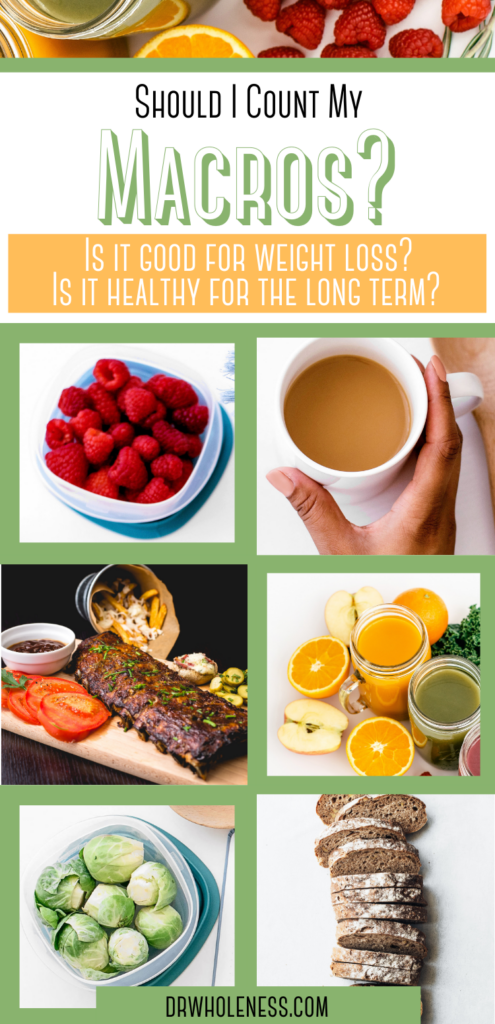Macro counting continues to be a popular way of consuming food. So, what is macro counting anyways and should I count my macros?
Macro counting is when you keep track of your grams of protein, carbohydrates, and fats each day from the food you consume.
Over the years, I have seen many people lose weight via macro counting and I have seen many people gain a better understanding of what they are putting into their bodies via macro counting, so it is not a terrible tool, but it can have some significant downsides to it.
Why you should eat real food instead of counting macros
Time and time again, I have seen people counting macros while sacrificing real food because the real food doesn’t fit into their macro goals.
For instance, many patients have told me that they eat processed deli turkey or chicken on their macro meal plan because it is already packaged and has the macronutrient amounts listed on the label.
Or they have a peanut butter cup instead of an apple as a snack because it fits their macros better. Or instead of eating grass-fed beef or Alaskan salmon, they drink a premixed premier protein drink from Costco because there is too much fat in the salmon or beef.
Can you see where this is going? The body is amazing at picking up the slack even when we have completely depleted it of resources. But at some point, it simply can’t make up for the lost nutrients.
Is there value in tracking your macronutrients?
Is there value in tracking your portions, tracking your macronutrients, weighing your food, using a particular size plate or bowl, writing down what you ate? 100%.
In the industrialized world, we live in a state of overwhelming food abundance.
So if you are not consciously considering what you are eating both in caloric density and in food quality, you could easily find yourself with a body composition you do not desire and in a state of health, you were not hoping to attain.
So many patients over the years have exclaimed to me that it is not that they eat bad food (for starters once we start calling foods good or bad we are making our food relationship very challenging), rather it is that they just eat too much good food or food they consider healthy.
But once we really get down to the food items they consume on a daily basis, it is quite apparent that what they have been taught related to healthy, life-giving food is not actually real whole foods.
If you are eating processed food regularly then you better count your macros, otherwise, you are not going to know when enough food is enough food.
Counting macros for weightloss
Counting macros is almost guaranteed to give you short term acute success. Eating real whole food day after day while considering the macronutrient make up of those foods is a long term strategy for health and body composition success.
Do not be fooled, macronutrient counting is the same thing as calorie counting except that you are counting the macros that add up to the calories as opposed to counting the calories.
Consider that 1 gram of protein equals 4 calories, 1 gram of carbohydrates equals 4 calories, 1 gram of fat equals 9 calories.
So, if you want to lose weight and macro counting is your plan of choice, not whole foods with a macronutrient counting bias, then the only way you will lose weight is if the macronutrients you are consuming add up to fewer calories than your body uses in a given day. Click here to read about how protein can help with fat loss.

Eating for health
Unfortunately, this way of thinking about food inputs is far too simplistic and too often leaves patients and clients unable to maintain their desired fitness and/or body composition goal.
If on the other hand, you are consuming whole, real food day after day, you are turning down inflammatory processes in your body, you are supporting optimal detoxification, you are giving your hormones the nutrition they need to perform the tasks of regeneration in your body, you will be creating a younger more capable you.
The results may not be 10-20lbs in 4-6 weeks but 6 months from now, 1 year from now, you will have a body that doesn’t fluctuate by 5lbs any time you don’t eat perfectly.
You will have a body that naturally gives you satiation signals that you can trust and hunger signals that you can trust.
This is health accumulation. Your body is able to operate on autopilot because it has received real food input, after real food input.
Talk about elevating your mind and your relationship with food.

Use macro counting as a tool
So should you count your macros?
Consider macronutrient counting as a tool to refine your whole foods eating plan if your body composition or energy levels are not where you desire them to be.
If you allow it to be the foundation or the frame of your food plan, you will find yourself lacking in health and likely not enjoying your relationship with food.
